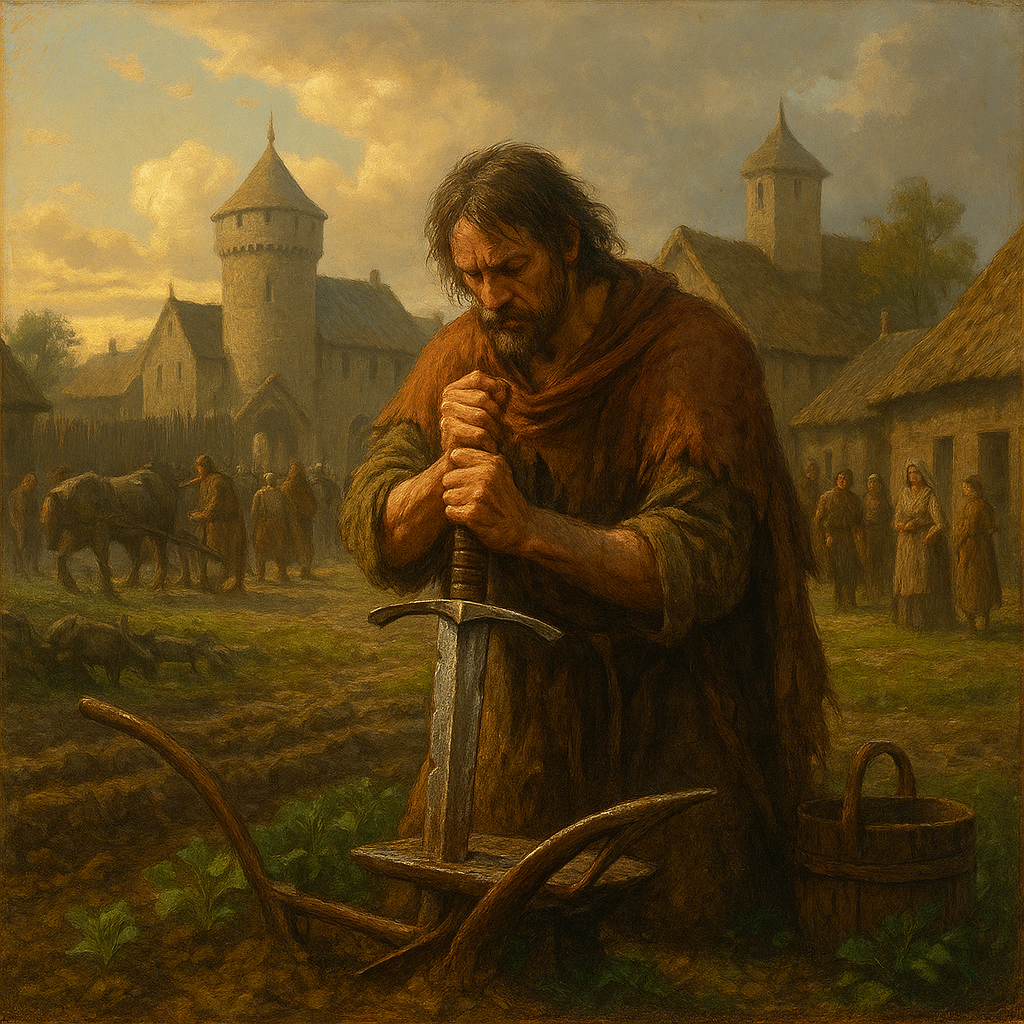The Civil Age
"We clawed our way from the rubble with broken nails and empty bellies. But we made a kingdom out of the bones." - Emmarelle Valmore, First Queen of Everwealth
The Civil Age, is an ironic twist given the truth of the era in which we now live; A bitter age of decay and survival that followed the end of The Great Schism. Officially dated from the year 0 CA (Civil Age) and now marking year 483, it is the time of grim continuity, hard-won victories, and small luxuries paid for in blood. Though it lacks the grandeur of The Lost Agess or the mythic resonance of The Dawn which birthed our realm and those behind it into being through explosive fury which thundered across the cosmos, the Civil Age is the most immediate and relatable to the peoples of Gaiatia. It is the age of what remains. What still breathes. What can still be built after the Schism took it all away. A Kingdom of Ashes:
The Civil Age began not with a coronation or treaty, but with the cessation of screaming. For a hundred years prior, Gaiatia burned. The Schism, born of apocalyptic fallout from The Fall and worsened by holy wars, arcane disasters, famine, and mass exodus, had left the world in tatters. When the smoke finally thinned, survivors emerged to a landscape barely recognizable: cities in ruin, rivers of poisoned earth, entire nations rendered myth by their near-extinction. Everwealth, Kibonoji, and Kathar would arise from this wreckage. Of them, Everwealth stands as both miracle and warning, a land formed from shattered pieces, barely held together by necessity, resolve, and greed. Named not for what it was, but what it promised, Ever-Wealth. founded by warbands of refugee monarchs, scholars, and outcasts fighting against an army of Elfs who intended to drive them out from their makeshift new homes with nowhere else to go. No guidance, no hope, just a desperate scramble to live another day; One battle after the next,t hey built a cities amid ruins, set laws by firelight, and repelled a dozen petty invasions in their first decade alone. Civilization, not just here, but around the entire world, such as it was, for their own reasons as-much as ours, had returned. Barely. The Struggle for Stability:
The Civil Age has been defined by three pillars: scarcity, corruption, and survival. For every miracle salvaged from The Lost Ages, there are ten systems broken beyond repair. Food remains scarce. Clean water is a privilege. Infrastructure fails daily. Magic is regulated, science fragmented, and the gods, once towering forces of metaphysical order, are now little more than bureaucratic entities managing faithful quotas and watching their flocks devour each other. The Scholar's Guild, The Arcane Coalition, and The Merchant's Consortium dominate civic life, often more powerful than crown or church. Their archives and vaults hide the last surviving knowledge of the old world, guarded like treasure, doled out in pieces. Meanwhile, monsters prowl the outskirts. Diseases born from mingled magicks and pollution continue to rot through populations. Political corruption is not the exception, it is the system. And the common folk? They persist, they labor, they bury their young, and they laugh when they can. An Age of Contradictions:
Despite its hardship, the Civil Age is not without its strange beauties. Everwealth, for all its misery, has become a center of diversity and raw potential. A peasant may become a warlord. A war orphan may uncover a ruin and become richer than kings. A dying wizard may pass knowledge that reshapes the continent. Art still thrives, often as rebellion. Religion mutates, adapts. Guilds, gangs, and adventurers fill the void where order once stood. Ruins of the Lost Ages attract treasure hunters and scholars alike, each hoping to reclaim what was. Cities such as Opulence, Bordersword, and Catcher's Rest stand as monuments to grim perseverance. But progress is glacial. Every step forward cracks the ground beneath it. Even the term "Civil Age" is a lie to some, a label meant to soothe a world that still burns beneath its skin. The current king is no tyrant, but no savior either, locked away without heir, in fear he may be the last of his line, helpless and blind to his people's anguish. Reforms are toothless. Borders erode. War brews anew with the Elfese to the east. The kingdom teeters, always. Where We Now Stand:
The Civil Age is an age of scavengers and survivors, of patchwork nations and half-remembered dreams. It is a time where people no longer ask, "How do we rebuild?" but "What can we get away with?" Faith is a currency. Secrets are power. Every tool is a weapon if sharpened just right. It is an age where glory is possible, but never clean. And yet, Despite everything, the people of Everwealth endure. Not with grace. Not with ease. But they endure. For in this age, there is no destiny. No prophecy. Just chance, grit, and ruin. Echoes of the Past, Seeds of the Future:
Some scholars argue the Civil Age is merely the aftershock of The Great Schism, a long, slow death rattle. Others say it is the soil from which the next true age will bloom. The truth likely lies in both. One can walk the streets of Opulence and see children playing with rusted relics. One can stand atop a Schismatic crater and see the stars begin to shine through the smog. The Civil Age is not about what was. Nor what should be. It is the age of what is. What remains. What must be done. A world of impossible choices and brutal consequence. And yet... There are still people trying. Still hearts unbroken. Still songs sung. And sometimes, that's enough to start again.



Comments